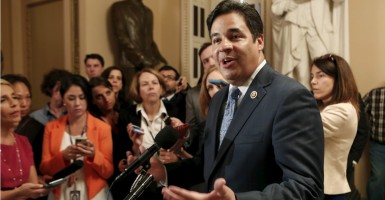The Senate took a “step in the right direction” by bolstering a fast-tracked House bill to repeal Obamacare during the budget reconciliation process, Rep. Tim Huelskamp, R-Kans., told The Daily Signal. But rather than renew a push for what he calls “repeal lite,” Huelskamp said, conservatives should “start over” in 2017 and pursue “a fuller repeal” of the health care law.
The Senate passed its bill rolling back key provisions of the Affordable Care Act by a vote of 52 to 47 Thursday night. The measure also places a one-year moratorium on funding for Planned Parenthood.
“This is a good exercise for us to know exactly the process of reconciliation,” Rep. Raúl Labrador, R-Idaho, told The Daily Signal on Wednesday.
A bill offered as a budget reconciliation measure requires only a simple 51-vote majority rather than the 60 normally needed to avert a filibuster in the Senate. To qualify for this fast-track status, legislation must specifically address government spending and revenues.
Senate Republicans early this week had announced the aggressive plan to eliminate key provisions of the Affordable Care Act and phase out the related expansion of Medicaid for low-income Americans. Although the Senate plan repeals more of Obamacare than the House bill, it leaves in place other major parts of the law, such as regulations of the insurance market and the Independent Payment Advisory Board.
Huelskamp acknowledged that although imperfect, the Senate action comes at an opportune moment to force a presidential veto.
“You’ve got to put President Obama on the line. [As] premiums are going up, it turns out to be a good time politically,” Huelskamp told The Daily Signal on Wednesday. “I’m getting my premium increase notices in the mail, and others are as well.”
>>> Find Out How Your Senator Voted on Repealing Key Obamacare Provisions
Since 2010, Republicans have campaigned on promises to repeal Obamacare in full. Now, going into the final year of Obama’s second term and with majorities in both houses of Congress, they’re trying to make good on that pledge.
Labrador said the Senate bill “absolutely” is consistent with that promise, and he will support “anything that moves us forward and closer to actual repeal.”
The push to repeal Obamacare was more than political posturing, Labrador insisted, because it sets the stage and prepares Republicans for a second effort.
Lawmakers debated among themselves over whether the initial House reconciliation package that partially repealed Obamacare would qualify for the 51-vote threshold. Because the plan targets the budgetary core of the health care law, it was expected to clear this hurdle.
The White House already has warned that Obama will veto any bill that repeals his marquee health care law.
Surveying the political landscape, Labrador said the reconciliation process will be the only repeal option for Republicans in the future.
“Even if we win the presidency and if we keep the Senate, we’re not going to have the 60 [Senate] votes needed for repeal,” the Idaho Republican said.
The chairman of the House Freedom Caucus, Rep. Jim Jordan, R-Ohio, sounded confident that conservatives could successfully redeploy a reconciliation measure.
“With a Republican president in 2017,” Jordan wrote The Daily Signal, “we can do what we promised the voters we would do for years now: fully repeal Obamacare.”
The Senate’s revised bill represented a second effort to placate entrenched conservatives demanding full repeal. In October, three Republican senators—Ted Cruz of Texas, Marco Rubio of Florida, and Mike Lee of Utah—vowed to oppose any effort during budget reconciliation that failed to repeal all of Obamacare.
All three senators voted Thursday night for the bolstered package.






























